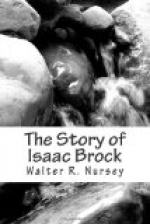While these fateful and stirring scenes were being enacted at Queenston, a despatch rider arrived from Evans of Fort George. Without waiting for further instructions, he had, after Brock’s departure, with the first glimpse of daylight, cannonaded Fort Niagara. This he did with typical thoroughness. His fire was returned with interest. With a license in direct opposition to the laws of battle, the enemy, under Captain Leonard, turned his guns on the village of Newark, bombarding public buildings and private residences with hot-shot, laying part of the town in ashes. This infuriated Evans, and he renewed the siege with so much vigour that he compelled the American garrison to evacuate. A shot from one of his twelve-pounders burst within the centre of Fort Niagara and decided Leonard to abandon his position in haste, after suffering many casualties.
* * * * *
Under a nasty crackle of musketry, galling and accurate, which harried the men, already chilled and strung up with suspense, the small detachment following the courageous Brock from the lower village soon reached the stone walls that surrounded a residence at the base of the hill. Here our hero dismounted, handed his horse to an orderly, and directed the men to find shelter. A moment later, taking advantage of a lull in the firing, he vaulted over the wall, and waving his sword above his head, shouted to the grenadiers a word of encouragement. They answered with a cheer, still following him as he led the way up the steep ascent towards the captured battery.
Wool, within the enclosure of the redan, was closely watching the steady advance of the small body of resolute men breasting the Height.
The purpose of these men was unmistakable. As they drew closer, scarlet uniform and polished bayonet blazed and flashed in the sunshine. Having been heavily reinforced, he detached a party of 150 picked regulars, and with these moved out to meet the small band of British led by Brock. A brief exchange of shots took place, and the Americans fell back, firing.
Though the rain had ceased the trees were gemmed with drops that still dripped. The ground was strewn with wet leaves, slippery, and affording treacherous foothold. Progress was slow and laborious. As the hillside grew steeper, a man here and there slid, lurched and fell. To maintain any semblance of formation was impossible. The fire grew hotter. Ball and buckshot and half-ounce bullets down-poured on them from above. “Death crouched behind every rock and lurked in every hollow.”
Had Brock’s handful of loyalists been able to rush headlong, spurred by lust of conflict, and lock bayonets with the enemy, another tale might have been told. But the effect of the futile struggle for foothold on the hillside, seamed with slippery depressions, in the teeth of a blizzard of lead, soon showed. The bullet-swept ascent was a cruel test for men already fagged and faint. As for our hero, though storm-beaten, stained with mud, and hungry as a wolf, he was still the same indomitable youth who had scaled the cut cliffs of Cobo in search of seagulls’ eggs. His vigour and disregard of danger were magnificent. His example, splendid.




